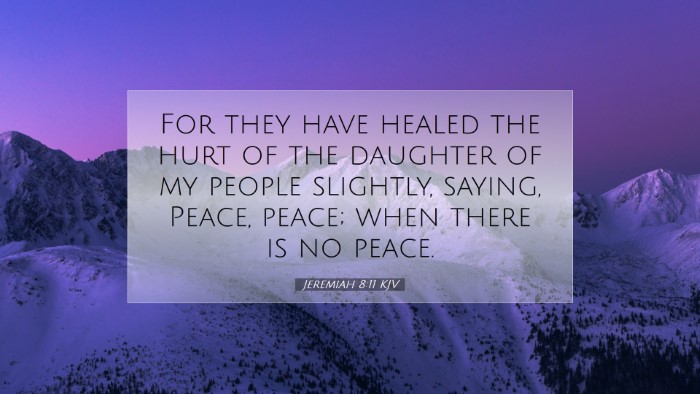Commentary on Jeremiah 8:11
Jeremiah 8:11 states:
"For they have healed the hurt of the daughter of my people slightly, saying, Peace, peace; when there is no peace." (Jeremiah 8:11, KJV)
Introduction
This verse serves as a poignant reflection on the state of Israel during the time of Jeremiah, revealing both the superficiality of false prophets and the deep spiritual malaise affecting the people. The imagery of healing captures the essence of how leaders mislead the people into a false sense of security regarding their moral and spiritual conditions.
Verse Analysis
In analyzing this verse, several key themes emerge:
- False Security: The phrase "Peace, peace" signifies a quick and shallow proclamation of safety, which belies the true spiritual dangers facing the people.
- The Role of Prophets: It highlights the responsibility of prophets to speak truth, yet they often succumb to the temptation of offering only comforting words.
- The Reality of Judgment: There is a stark contrast drawn between the false reassurances and the impending judgment that looms over a wayward people.
Commentary Insights
Matthew Henry
Henry emphasizes the duplicitous nature of the prophets in this passage. He explains, "They only appear to care for the people’s welfare while offering false hopes of peace." This superficial remedy provides little more than a placebo effect for a wounded nation. Henry asserts that this behavior leads to further spiritual decay, as people are persuaded to neglect the truth and harden their hearts against genuine repentance.
Albert Barnes
Barnes provides a historical context which is essential for unlocking the full meaning of the text. He notes, "During a time of national crisis, the leaders gave false assurances, fostering a misleading sentiment that distracted from the sinfulness of the people." He offers a deep analysis of how these leaders failed to address the root issues, leading to a populace unprepared for the reality of their situation. Barnes prescribes that to genuinely heal, leaders must rightly identify and confront the spiritual maladies present in their society.
Adam Clarke
Clarke delves into the linguistic elements of the text, commenting on the repeated phrase “Peace, peace,” discussing that the repetition indicates a fervent denial of the reality. He posits, "The frequent declaration of peace does not equate to its presence; rather, it highlights the desperation of those in power to avoid uncomfortable truths." Clarke argues that the true peace that God offers is often neglected when leaders choose to favor comfort over truth.
Theological Implications
This verse serves as a crucial reminder for modern-day leaders in the church and community settings. It poses serious questions regarding the responses of spiritual leaders towards contemporary issues. Are today’s prophets and teachers proclaiming a comforting peace without addressing the urgent need for repentance? How can one discern genuine peace from the false assurances that echo the sentiments found in Jeremiah's time?
Practical Applications
Moving from theological reflection to practical application, we can derive several key lessons:
- Discernment in Leadership: Pastors and spiritual leaders must prioritize truth over popularity. Like Jeremiah, they are called to be watchmen who speak the truth in love.
- Encouraging Genuine Repentance: A true message of peace requires acknowledging sin and the need for God's grace to restore. The people of God must thus be taught to seek real reconciliation with Him.
- Awareness of Spiritual Condition: Congregations must be encouraged to reflect on their own spiritual health—examining whether they are seeking superficial assurances or a transforming relationship with God.
Conclusion
Jeremiah 8:11 stands as a timeless warning against the allure of false peace and superficial healing. The combined insights from respected commentators highlight the importance of authentic prophetic ministry that dares to confront sin while calling for genuine repentance. The faithful remnant of today’s church must strive to uphold truth, delivering both warning and hope to a world desperately seeking peace.


